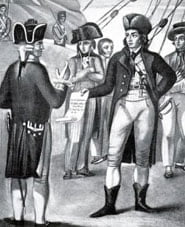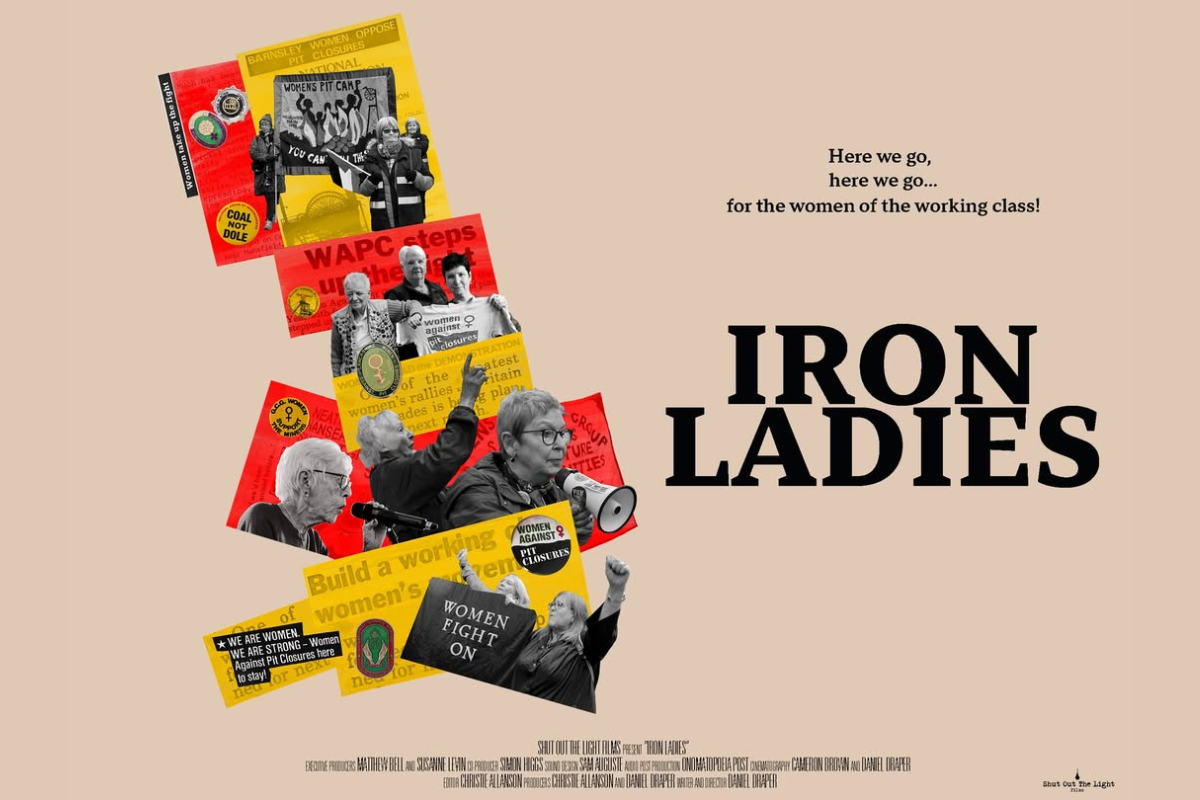The State
can ultimately be reduced to bodies of armed men. These bodies of armed men are
used by the ruling class either to maintain its power against what it sees as
internal enemies, to defend itself against foreign aggression, or in support of
its own aggressive action against foreign nations. Since its power lies in its
ability to threaten or actually to use force, the ruling class regards anything
that jeopardises the effectiveness of the State apparatus with the utmost
seriousness. This explains why mutinies in the armed forces are of such concern
to them.
In April and May of 1797 the
British ruling class was horrified when two naval mutinies broke out; the first
was at Spithead, close to Portsmouth; the second at the Nore which marks the
seaward approach to the Thames Estuary. These occurred in some of the Royal
Navy’s most powerful fighting ships and in the middle of a desperate war
against the French. The first mutiny was characterised by rigid discipline, a
respect for good officers and utter loyalty to the King on the part of the
mutineers. The second was more complicated.
Ostensibly these mutinies were
about concrete grievances concerning pay and living conditions at sea. The pay
of sailors had not increased since 1653 while prices had risen dramatically.
Pay was frequently in arrears and sometimes withheld for years as a deterrent
to desertion. It grated that army pay had been significantly improved in 1795
while that of naval ratings was apparently forgotten. Sick and wounded men
received no pay at all. Another issue was that of leave to go ashore. The
bigger fighting ships spent much of their time engaged in tedious but demanding
duties blockading French naval ports. Even when they returned to port, the crew
was usually not allowed a run ashore, again for fear of desertion. Other
sources of discontent included the poor quality of the provisions and bullying
and arbitrary punishments, usually imposed by noncommissioned and petty
officers.
In wartime, the Royal Navy was
always short of men. It received some volunteers but never enough. The
pressgang swept up sizeable numbers of enforced recruits and was normally only interested in those who had at least some
experience of ships and the sea. There were not enough such men. Because
of serious under-manning, the Quota Acts were passed in 1795 and 1796. These required counties and boroughs to
supply a specified number of men for naval service. Many were found
among men awaiting trial or sentencing or incarcerated in debtors’ prisons.
Those liable to be hanged or transported often preferred to take their chance
at sea. Their presence in the crowded confines of a fighting ship often harmed
morale as they found it hard to fit into the live-and-let-live style necessary
for shipboard life. Also swept into the Royal Navy was a sprinkling of
political dissidents who found fertile ground for their ideas among their more
disenchanted shipmates. While some of these men were natural leaders, the naval
authorities saw them only as potential trouble-makers, described disparagingly
as ‘sea-lawyers’.
At this time ordinary people had no
effective way of obtaining redress for their grievances about wages, rising prices, the stinginess of the Poor
Law, the corruption in political and public life and all the other
issues which concerned them. Inevitably by impressing into naval service
thousands of working men, forcibly plucked from family, friends and all that
was familiar, the government was creating potential trouble. Sporadic mutinies
had occurred in the Royal Navy over the previous century but they were usually
the last desperate measure of a crew pushed beyond breaking point by bullying
officers or failure to receive some or all of their pay. In the case of the
naval mutinies, however, those caught up by the pressgang had inevitably been
influenced not only by their own everyday concerns but also by the recent
revolutionary events in France. These had demonstrated that ordinary people
were capable of throwing off their oppressors and changing the course of
history. In a lesson as important today as in the 1790s, revolutionary events
in one country clearly provided an example and encouragement to those engaged
in the class struggle elsewhere. The class struggle has always been
international.
In February and March 1797, the Admiralty
and Lord Howe, the widely respected officer commanding the Channel Fleet,
received a number of anonymous petitions purporting to come from men in ships
in his fleet demanding better pay. Clearly these communications were the result
of co-ordinated activity between the various ships; something always dreaded by
the authorities. When the Channel Fleet returned to Spithead, there was a
palpable sense of resentment and expectation among almost all the ships. The
Admiralty’s answer to the seething discontent was to order the fleet to sea
once more in the hope that the rigours of ship-handling would leave no time for
the fomenting of discontent. The men responded on 16 April by collectively
refusing to obey the order to weigh anchor. For the next week the fleet was
immobilised by the mutineers while a body of elected delegates, two from each
ship, constituted a council of deputies which carried on negotiations with a
number of senior admirals, most of whom verged on the apoplectic at the very
idea of negotiating with mutineers rather than hanging them from the nearest
yardarm.
A few especially unpopular officers
were put ashore but no violence or indiscipline was tolerated by the delegates
and the ordinary routine of the ships continued except that the fleet was under
the control of delegates elected by the men
of whom it was composed. The mutineers had highly capable leaders who went to great lengths to stress that they were
patriotic, loyal to the King and that they would put to sea immediately
if the French fleet posed a threat. They called for an increase in pay, various
improvements in the supplies of food and drink and how the sick and wounded were treated. They also protested about
the presence on board of so many pressed men, not only the total landlubbers
but those criminal elements who were having a disruptive effect. The Admiralty
agreed to deal with most of their demands and an official royal pardon was
issued on the 23 April 1797. The first Spithead Mutiny was over.
Unfortunately the measures promised
required the authority of Parliament. Action was slow in coming and the men began to feel that they had been
duped. On 7 May the mutiny broke out again and the tension was greatly
exacerbated when Admiral Colpoys ordered the officers of his flagship ‘London’
to fire on the mutineers, several of whom were killed. It was only by great
efforts on the part of the delegates that the men on board were restrained from
hanging the admiral. Colpoys and over 100 officers were put ashore but the rest
remained aboard although the delegates once more took effective command of the
fleet. Two days later the relevant legislation was passed by Parliament and Admiral Lord Howe came down to Spithead to
assure the delegates that their demands were being implemented. They responded
by demanding that about fifty particularly unpopular officers should be
replaced and Howe on his own authority wisely conceded this point. On 15 May
the second Spithead mutiny was over and two days later the fleet set sail for
further blockading duty off the French coast.
Meanwhile,
however, another mutiny had broken out. This was at the Nore, close to the
naval dockyards at Chatham and Sheerness. The Nore was not a naval station as
such but many ships often anchored there waiting for orders. There were just
three ships-of-the-line (what we think of as battleships) and some frigates
when mutiny broke out on 12 May, initially in support of their peers at
Spithead. The men’s demands were more wide-ranging. They included the immediate
implementation of the concessions already won at Spithead, more regular pay, an
automatic right to shore leave when in port, more equitable distribution of
prize-money, a pardon for deserters and a veto on the appointment of unpopular
officers. The largest vessel on the station was Sandwich, a huge
ship-of-the-line considered to have perhaps the worst living conditions of any
British warship of the time. It was built for
a complement of 750 officers and men but contained double that number.
It was riddled with infectious disease and a hotbed of seething resentment.
Corporal
punishment was not among the grievances and in fact the mutineers flogged
several of their own number for drunkenness.
The mutineers’ leaders imposed a rigorous discipline, preventing all
communication with the shore, while not hesitating to fire on any ships that
tried to leave the anchorage. The Admiralty, having had such a bad fright, was
in a less conciliatory mood this time and
when senior officers arrived on the scene, they refused to make any concessions
and put an embargo on the food and other supplies the ships needed. They
had assessed the mood and the circumstances and considered that the leaders had
less popular support among the ships at the Nore and little wider support. The
fact that the relatively small number of ships at the Nore had refused to sail
was not deemed such a great risk to national security as the Spithead mutinies
could have been. Two of the vessels at the Nore quickly managed to escape.
At Spithead there had been a
collective leadership of ‘delegates’ but at the Nore one particular leader took
the limelight and seemed to revel in it. His name was Parker and he was an
intelligent, experienced seaman. He was also
a loose cannon, a resentful egotist who styled himself ‘President’,
revelled in the trappings of power and was therefore resented by many of his
fellow-mutineers. In turn he voiced his contempt for the ‘lower classes’ who he
described as ‘cowardly, selfish and ungrateful’. While some officers were
violently treated, the men were at pains to stress that they were loyalists and
that their action was neither rebellion nor mutiny but a justified strike for
better conditions. This viewpoint was not accepted by the Admiralty, who were
in no mood to parley with those they described
as ‘rebels’ whose motivation was seditious and political. Meanwhile the
Government was drawing up a raft of legislation making incitement to mutiny punishable by death and giving the Admiralty the power to
declare a ship to be in a state of rebellion. This meant that anyone remaining
on board was a felon or a pirate while those having friendly dealings with them
also committed a capital offence.
The Admiralty
was prepared to play a waiting game and the mutiny was on the verge of collapse
when it received an unexpected boost with the arrival of most of Admiral
Duncan’s ships, which had been cruising off Great Yarmouth and which had also
mutinied. This was now a serious issue because Duncan’s squadron had been
engaged in blockading the enemy Dutch fleet. It threatened national security
because Duncan was left with only two loyal ships, and it was only a matter of
time before the Dutch realised this and sailed out to meet them. Had it
actually taken place, the ensuing battle would have been a one-sided
confrontation. The arrival of these ships was a mixed blessing. It provided
welcome reinforcements for the men at The Nore but allowed the authorities to portray
them as deserters who had abandoned their posts – therefore even worse than
simple mutineers. An attempt was made to blockade much of the merchant shipping
sailing to and from London but the rebels themselves effectively became
blockaded and crucially began to run out of fresh water, something always
harmful to morale.
After
Duncan’s ships had joined those at the Nore, red flags had been hoisted and a
declaration issued that they now constituted a ‘Floating Republic’. Despite
this defiance, the situation was becoming highly volatile. A discussion took
place about sailing the ships to enemy or neutral ports but when this was agreed and the order to sail was given, not one ship
obeyed. There were serious differences among the leaders of the mutiny,
supplies were running short, several ships escaped and gave themselves up and
then the Admiralty removed the navigation buoys necessary for sailing among the
shoals of the Thames estuary. The mutineers were trapped. Increasingly
desperate, there were fights on board some of the ships between the hard-line
mutineers and men who wanted to give themselves up. The ships had all been
recaptured a month after the mutiny had broken out. 29 of the mutineers’
leaders at the Nore were hanged.
There is no doubt that these mutinies
struck fear into the hearts of the British ruling class. For many of them, no
mutiny could ever be justified and all of those involved should be hanged. The
Admiralty never acknowledged by word that the grievances were justified but as
we have seen they acknowledged it by deed
when they rectified many of the outstanding issues. It was fashionable
in some quarters to claim that the mutinies were the work of outside
influences, especially those associated with
the Jacobins in Revolutionary France. This of course is a standard ploy
in such situations. In this case it suggested that everything in the Royal Navy
was basically fine until troublemakers with their own agenda parachuted in to
make mugs out of the honest but gullible Jack Tars. Others contrasted the
‘unpolitical’, that is, the morally justified grievances of the Spithead
mutineers, with the ‘political’ and therefore malignant designs of the Nore
mutineers. The French, the Corresponding Societies, the Irish and even the
Methodists were among those blamed for fomenting the discontent. The writings
of the radical Tom Paine were widely circulated and were doubtless influential,
particularly among the more literate sailors. The notion was developing that
even those of humble birth had rights.
The ‘delegates’
at Spithead put their names to documents and petitions and, far from being
outsiders, they were nearly all able seamen or petty officers with long service
records. They were the natural leaders of the lower decks. Few of them were
Irish and none were pressed men who might have been natural troublemakers. Of
the 462 men charged with mutiny in 1797, exactly 106 had been born in Ireland
which is about the usual proportion of Irish sailors that would have been
expected at that time.
The politicians and other men of
power who made the wars and benefited from them had great contempt for those
who they compelled to do their fighting on their behalf. They were horrified
and appalled by the events at Spithead and
the Nore but these events forced the ruling class to improve the
conditions of the men who manned their ships and to start addressing many of
their other grievances. The lessons of such success are never entirely lost.
1797 was one small step in the onward march of working people for equality and
justice. These aspirations can only be achieved through the socialist
transformation of society.






